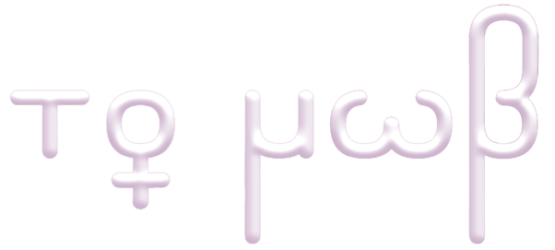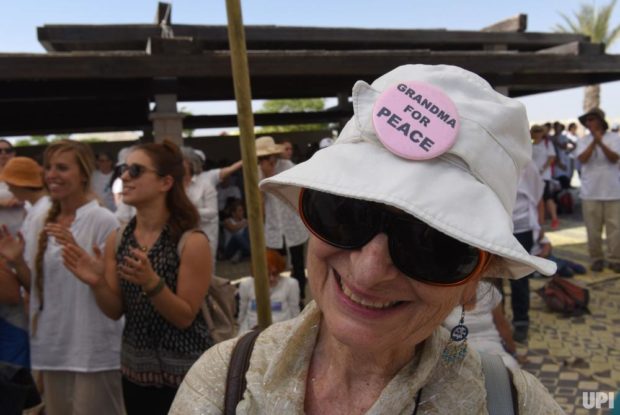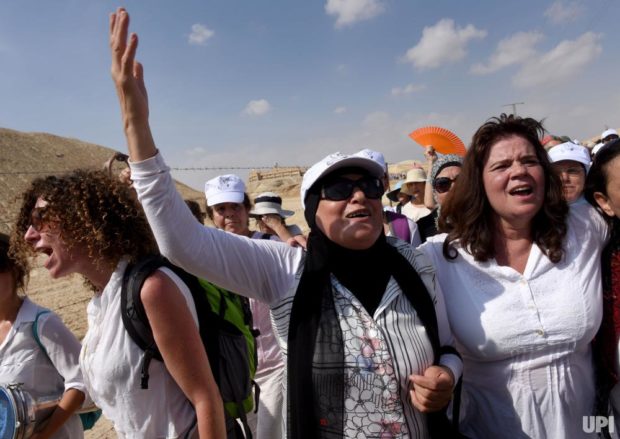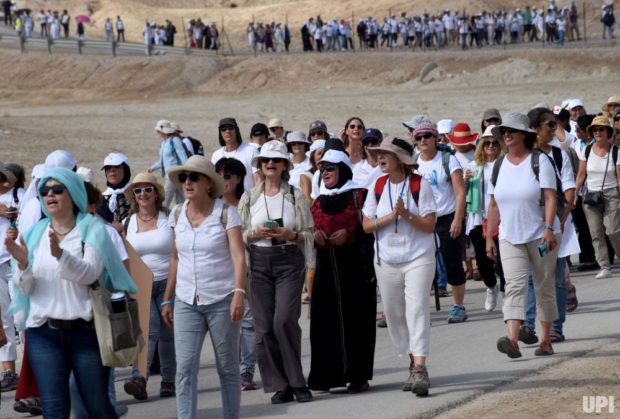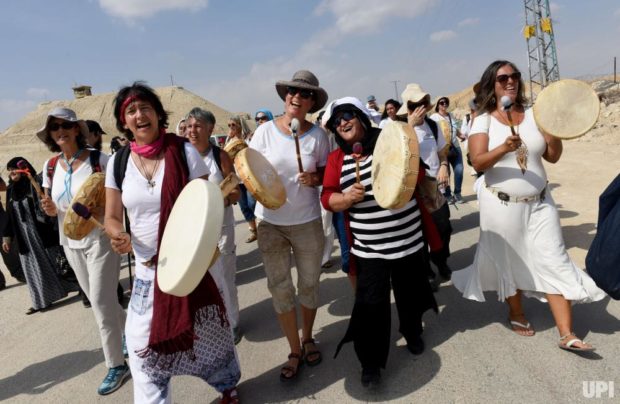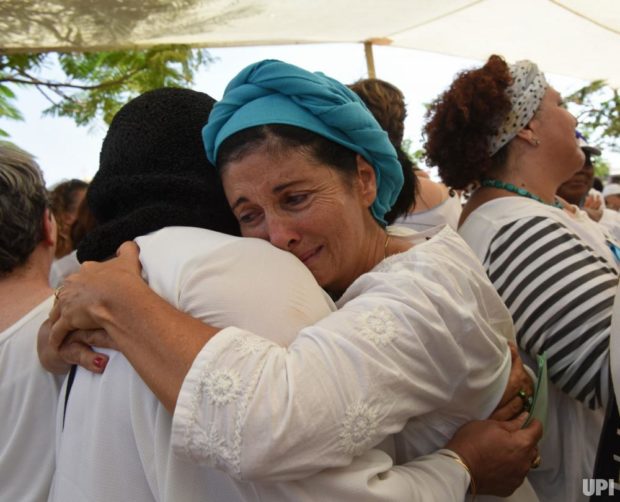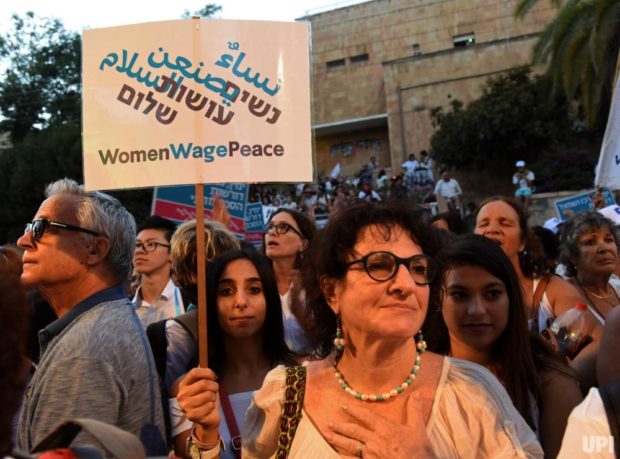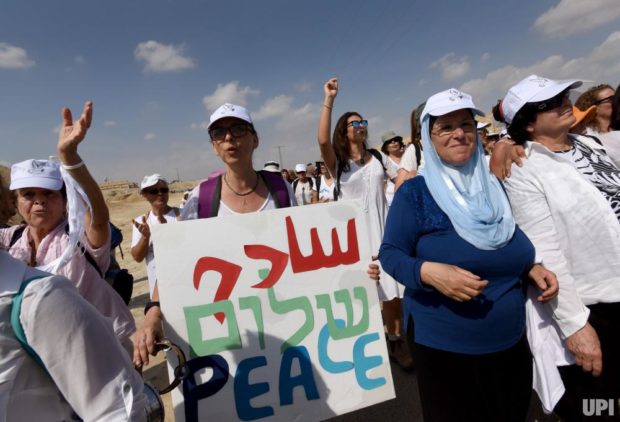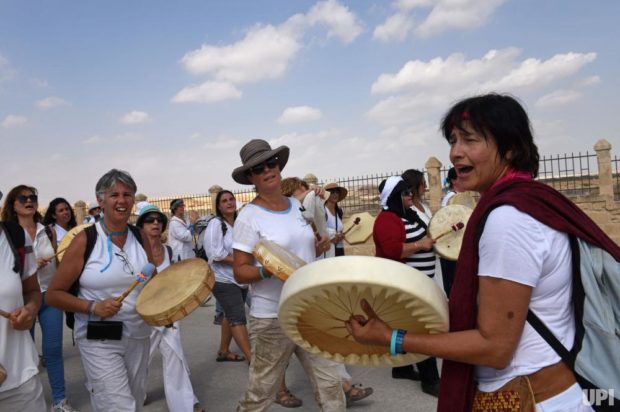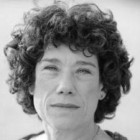By Orna Raz*
2016 was not a very good year for Israel, and we have become even more isolated in the world. So when I arrived to Oxford, for an international symposium on Women’s Leadership, I was worried that as an Israeli I would not be welcome..
But the women who attended the conference from all over the world: Italy, Britain, Ireland, United States, Australia, South Africa, Saudi Arabia, Kuwait, Canada, Pakistan, Turkey, Zimbabwe, Ghana and Kazakhstan, among others, were all gracious. And when they heard that I was active in Women Wage Peace they really warmed up to me and were especially friendly.
Although I didn’t come to Oxford to speak about Women Wage Peace, the interest in the movement convinced me that it was important to talk about our activism in Israel as an example of women’s leadership. So I asked for special permission to introduce WWP, explain its goal and describe its latest project: The March Of Hope.
The March Of Hope started on October 4th at the far northern border with Lebanon and it signaled the beginning of a two-week march which ended in a mass rally, in front of the prime minister’s home, in Jerusalem on October 19th. In the two weeks of the march (from Rosh Hashana to Sukkot) there were local events at different points along the way, and several solidarity marches took place outside Israel. On the last day about one thousand Palestinian women joined their Israeli counter parts in Qasr El Yehud to their march for peace.
The March of Hope was a momentous endeavor, and for more than a year the movement’s special projects team worked on making it happen. Most of the work: the vision, planning and organizing was carried out by volunteers. Throughout the year hundreds of women from different circles in the movement joined in for specific assignments. In September the projects team ran a digital fund raising campaign (Mimouna) in support of the march.
It is not easy to keep the enthusiasm and commitment of volunteers for a long period. Throughout last year the movement organized screening of an inspiring film: Pray The Devil Back To Hell, which details the struggle of the Liberian women to end the civil war in their country. One woman, Leymah Gbowee, who was featured in the film, was prominent in the struggle and was even awarded the noble prize for peace for her activity. Thus the projects team chose Leymah as a symbol, she was invited to Israel and took part in the last days of the march.
This ingenious move added a symbolic dimension to the march, it went beyond an earthly activity and became part of a universal struggle of women against wars and violence. To emphasize this aspect inspirational ceremonies were held in different destinations along the way. Leymah Gbowee herself gave at least 5 speeches and each time she spoke honestly and clearly about the power of women in the battle against violence and their special ability to resolve conflicts.
As the time drew near the whole movement pitched in, the March was supposed to make Women Wage Peace a household name and to reintroduce messages of hope and peace and it worked. Thirty thousands women took part in the march, and several thousands joined the movement following the march.
When I asked the 5 women in the projects team to describe the March Of Hope in a few words, there were common themes: They all spoke about the power of love and hope, about trust within the team, about honesty and good-will in giving feedback, about commitment, thinking outside the box, friendship, flexibility, sense of humor, and sisterhood.
Those are important principles that manifest themselves in our daily activities as well. I hope that in 2017 Women Wage Peace will be able to bring a viable political agreement to our region, or in the words of Yael Deckelbaum’s song, which was written in honor of the March Of Hope
From the north to the south
from the west to the east
hear the prayer of the mothers
bring them peace
bring them peace
https://youtu.be/YyFM-pWdqrY?t=30
SOURCE: THE TIMES OF ISRAEL, 8-1-2017
An Israeli woman wears a pin on her hat that reads “Grandma For Peace” during a march with Palestinian women with the “Women Wage Peace” march for a political agreement between the Israelis and Palestinians in Qasr al-Yahud near the Jordan River, West Bank, October 19, 2016. The women’s march is to urge lawmakers to act to bring a secure future for their children by making peace. Photo by Debbie Hill/UPI
Israeli and Palestinian women with “Women Wage Peace” march for a political agreement between the Israelis and Palestinians in Qasr al-Yahud near the Jordan River, West Bank, October 19, 2016. The women’s march is to urge lawmakers to act to bring a secure future for their children by making peace. Photo by Debbie Hill/UPI
Israeli and Palestinian women with “Women Wage Peace” march for a political agreement between the Israelis and Palestinians in Qasr al-Yahud near the Jordan River, West Bank, October 19, 2016. The women’s march is to urge lawmakers to act to bring a secure future for their children by making peace. Photo by Debbie Hill/UPI
Israeli and Palestinian women with “Women Wage Peace” march for a political agreement between the Israelis and Palestinians in Qasr al-Yahud near the Jordan River, West Bank, October 19, 2016. The women’s march is to urge lawmakers to act to bring a secure future for their children by making peace. Photo by Debbie Hill/UPI
A border police guards as Israeli Jewish and Arab women of “Women Wage Peace” march to Israeli Prime Minister Benjamin Netanyahu’s resident in Jerusalem, Israel, October 19, 2016. The women’s march is to urge lawmakers to act to bring a secure future for their children by making peace. Photo by Debbie Hill/UPI
A Palestinian woman plays drums with Israeli Jewish women while marching with “Women Wage Peace” for a political agreement between the Israelis and Palestinians in Qasr al-Yahud near the Jordan River, West Bank, October 19, 2016. The women’s march is to urge lawmakers to act to bring a secure future for their children by making peace. Photo by Debbie Hill/UPI
A Palestinian holds hands with Israeli Jewish women while marching with “Women Wage Peace” for a political agreement between the Israelis and Palestinians in Qasr al-Yahud near the Jordan River, West Bank, October 19, 2016. The women’s march is to urge lawmakers to act to bring a secure future for their children by making peace. Photo by Debbie Hill/UPI
Women hug during a rally of Israeli and Palestinian women with “Women Wage Peace” as they march for a political agreement between the Israelis and Palestinians in Qasr al-Yahud near the Jordan River, West Bank, October 19, 2016. The women’s march is to urge lawmakers to act to bring a secure future for their children by making peace. Photo by Debbie Hill/UPI
A Palestinian joins Israeli Jewish women at a rally of “Women Wage Peace” for a political agreement between the Israelis and Palestinians in Qasr al-Yahud near the Jordan River, West Bank, October 19, 2016. The women’s march is to urge lawmakers to act to bring a secure future for their children by making peace. Photo by Debbie Hill/UPI
Israeli, Druse and Israeli Arab women of “Women Wage Peace” march to Israeli Prime Minister Benjamin Netanyahu’s resident in Jerusalem, Israel, October 19, 2016. The women’s march is to urge lawmakers to act to bring a secure future for their children by making peace. Photo by Debbie Hill/UPI
Israeli Jewish and Arab women of “Women Wage Peace” demonstration outside Israeli Prime Minister Benjamin Netanyahu’s resident in Jerusalem, Israel, October 19, 2016. The women’s march is to urge lawmakers to act to bring a secure future for their children by making peace. Photo by Debbie Hill/UPI
Israeli and Palestinian women with “Women Wage Peace” march for a political agreement between the Israelis and Palestinians in Qasr al-Yahud near the Jordan River, West Bank, October 19, 2016. The women’s march is to urge lawmakers to act to bring a secure future for their children by making peace. Photo by Debbie Hill/UPI
Israeli and Palestinian women with “Women Wage Peace” march for a political agreement between the Israelis and Palestinians in Qasr al-Yahud near the Jordan River, West Bank, October 19, 2016. The women’s march is to urge lawmakers to act to bring a secure future for their children by making peace. Photo by Debbie Hill/UPI
Images: UPI (United Press International) – October 19, 2016
- Orna Raz
I have a PhD in English literature from the Hebrew University in Jerusalem and mostly write about issues concerning women, literature, and society. I lived in the US for 15 years (between 1979-1994). I am widow and last March started a support/growth Facebook group for widows: “Widows Move On.” I am an active member of Women Wage Peace and believe that women can succeed where men have failed.
